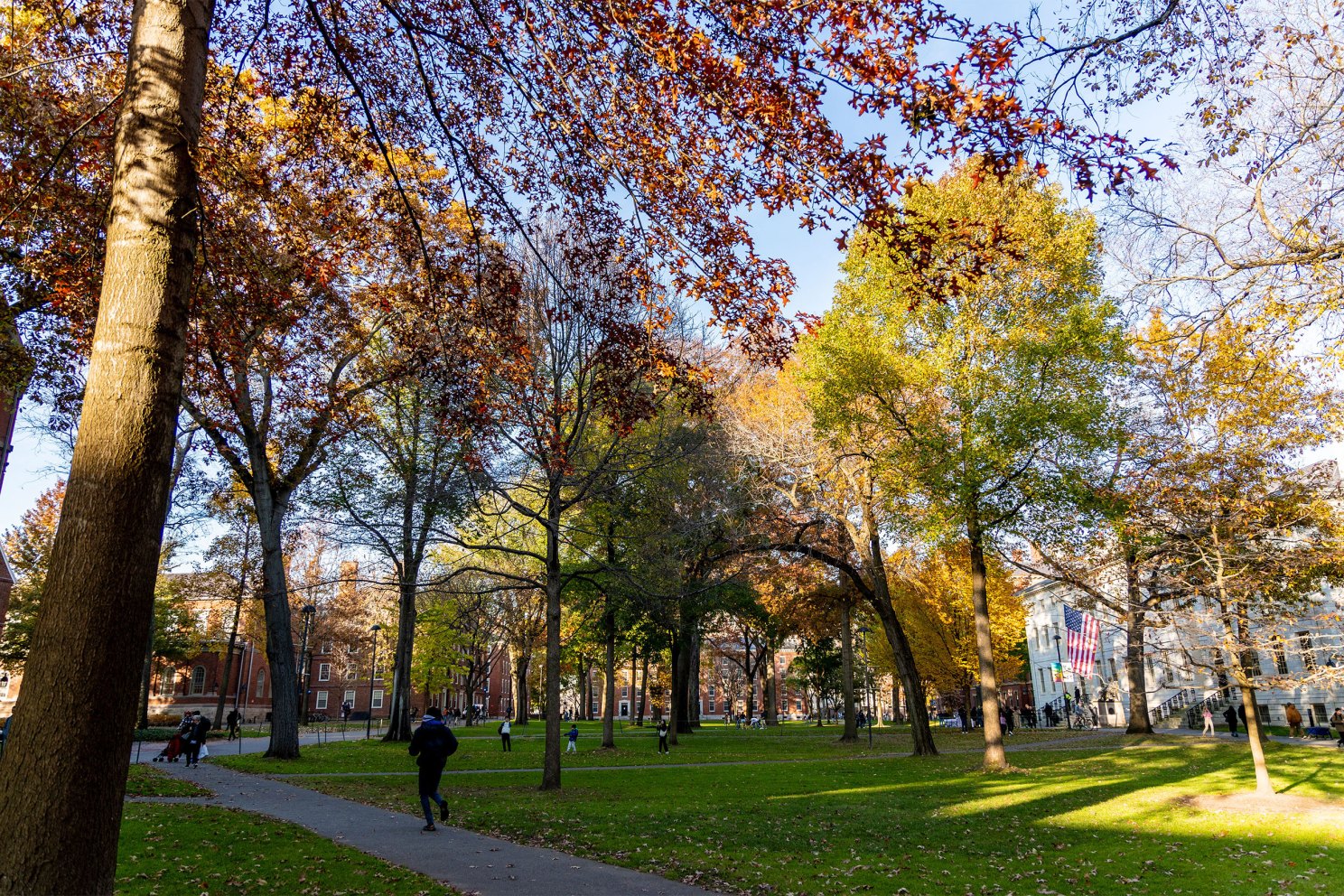
Photo by Dylan Goodman
Presidential task forces announce listening sessions
Task forces to combat antisemitism and anti-Muslim and anti-Arab bias will hear from Harvard College students, with more engagement planned across the University
Starting Monday, the Presidential Task Force on Combating Antisemitism and the Presidential Task Force on Combating Anti-Muslim and Anti-Arab Bias will begin holding listening sessions to hear from members of the Harvard community. The first round of sessions, open to Harvard College students, will take place over the next two weeks. The task forces will set sessions for the wider community in the coming weeks.
“We want these sessions to provide a safe space for those participating to share their lived experiences as well as thoughts on how we can best help them and help move our community toward healing,” said Asim Ijaz Khwaja, co-chair of the Presidential Task Force on Combating Anti-Muslim and Anti-Arab Bias, and Sumitomo-FASID Professor of International Finance and Development at Harvard Kennedy School.
“We will engage heavily and constantly with other students, staff, and faculty to figure out exactly what we can do to improve student life and the academic program at Harvard.”
Jared Ellias
In the initial series of events, each task force will hold structured, facilitated sessions organized in partnership with the College’s residential neighborhoods with the goal of gaining a deeper understanding of the unique experiences of Harvard community members.
“The sessions are designed to encourage students to express if and how they have been hurt, and what they would like to see change to restore to them a sense of community and wholeness. We want students to inform us about the problems they are encountering and to suggest solutions that the University can implement,” said Derek Penslar, co-chair of the Presidential Task Force on Combating Antisemitism and William Lee Frost Professor of Jewish History in the Faculty of Arts and Sciences. “To that end, each session will include task force members who will listen attentively, while student responses are noted anonymously. No audio or video recording of the sessions will be allowed, and what is said in the sessions should stay in the sessions — we will be following ‘Chatham House Rules.’”
The invitation to Harvard College students was sent Friday with details on the dates and locations of listening sessions. The sessions hosted by the Task Force on Combating Antisemitism will take place the week of March 25 and the sessions hosted by the Task Force on Combating anti-Muslim and anti-Arab Bias will take place the week of April 1. Information on upcoming sessions will be shared as they are scheduled.
“The task forces are assimilating the knowledge we are gaining in real time and looking for opportunities to identify ways in which our community can be brought closer together so we can enhance student life and academic life at Harvard University,” said Jared Ellias, co-chair of the Presidential Task Force on Combating Antisemitism and Scott C. Collins Professor of Law at Harvard Law School.
“We want these sessions to provide a safe space for those participating to share their lived experiences as well as thoughts on how we can best help them and help move our community toward healing.”
Asim Ijaz Khwaja
In addition to the listening sessions, the task forces will conduct historical analysis of the experiences of the affected populations and attitudes toward them. This will help to provide context around the nature, extent, and proximate causes of antisemitism and anti-Muslim and anti-Arab bias in the Harvard community.
“We are in the process of reviewing observations and concerns that have been previously raised by students and other members of our community,” said Wafaie Fawzi, co-chair of the Presidential Task Force on Combating Anti-Muslim and Anti-Arab Bias and, at the Harvard Chan School, the Richard Saltonstall Professor of Population Sciences and a professor of nutrition, epidemiology, and global health. “We are now keen to build on these to have a more complete picture of manifestations of bias on campus. As important, we are eager to obtain potential recommendations to take steps towards positive change.”
In January, interim President Alan Garber announced the two presidential task forces. Though each group has a different focus, they share a similar charge:
- Examine recent history and current manifestations of bias;
- Identify causes of and contributing factors to bias-based behaviors on campus; and,
- Evaluate evidence regarding the characteristics and frequency of these behaviors.
Together this information will shape recommended approaches to combat bias and to mitigate its impact on campus.
“The community should expect continuous and constant engagement,” Ellias said. “Our task forces include dedicated students and faculty, along with wonderful staff as advisers. But these are hardly the only voices that need to be heard as we go about our work. We will engage heavily and constantly with other students, staff, and faculty to figure out exactly what we can do to improve student life and the academic program at Harvard.”
During the first phase of public engagement, the task forces are prioritizing community outreach to better understand experiences of community members and to learn from internal and external work already underway. Interim recommendations will be made on a rolling basis and the task forces will issue a final report with findings and recommendations.
“The listening sessions provide an opportunity for us to start reflecting more deeply on our shared community values, and more importantly, to ask if we have truly embodied them. Have we fallen short? If so, how and why?” said Ali Asani, co-chair of the Combating Anti-Muslim and Anti-Arab Bias Task Force, the Murray A. Albertson Professor of Middle Eastern Studies, and a professor of Indo-Muslim and Islamic religion and cultures. “We hope these listening sessions, which will be rolled out across the University engaging students, faculty, and staff, can help us gain a clearer understanding of where we stand and where we need to go.”
In addition to the sessions, both task forces are welcoming comments at AntisemitismTaskForce@harvard.edu and AntiMuslimAntiArabBiasTF@harvard.edu.




